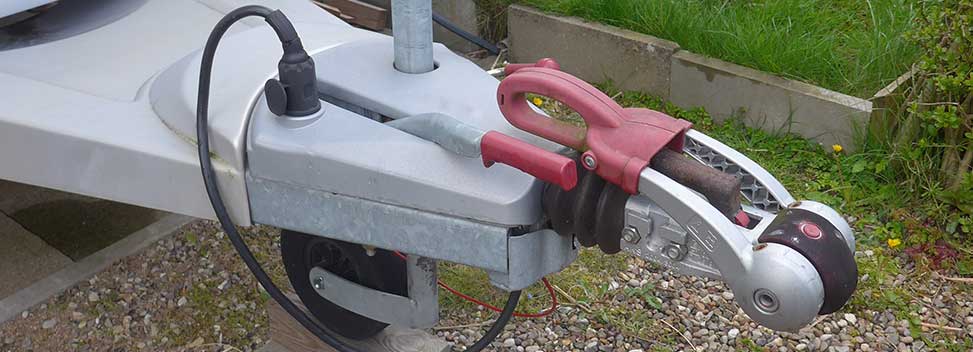How to check and set your caravan’s noseweight
Written by Nick Grant
4 Apr 2023
6 min read

What is a caravan’s noseweight?
A caravan’s noseweight is the downward force or weight exerted from the caravan hitch to the tow car’s tow ball. Attaining the correct noseweight is crucial to safely and securely tow your caravan.What is the correct noseweight?
Your required noseweight will depend on the manufacturer of your car and caravan. The weight of your caravan should apply a slight downward force on the rear of the car, which helps your car’s back tyres grip the road to give you control and stability behind the wheel. Typically, the recommended noseweight to ensure towing stability is 5-7% of your caravan’s laden weight1. The noseweight of your fully-loaded caravan should not exceed the maximum limit of your caravan or on your car’s towbar.How to check the noseweight
When you’ve towed your caravan, it’s time to check the noseweight. To do that, you’ll need the following things1:- The tow vehicle’s noseweight limit - You can find the required noseweight for your caravan in your car manufacturer’s handbook.
- The tow bar’s limit – This info will be on the plate attached to the tow bar.
- The caravan chassis limit – This is the number that proceeds the ‘S’ on the AL-KO hitch.
- Slot its narrow end into the hitch-head.
- Carefully and gently wind in the jockey wheel so all of the caravan’s noseweight is being carried by the noseweight gauge.
- Take the reading to see how if it’s in line with the required level.
- Park your caravan on a level surface that’s firm and flat—such as concrete or tarmac—with the steadies raised and wheels chocked.
- Position the piece of wood on the scales. This is to spread the load and reduce the risk of damage to your scales.
- Wind the jockey wheel down to raise the hitch and place the scales underneath.
- Insert the broom handle into the hitch head. And then down onto the wood on the scales.
- Wind the jockey wheel up until the weight of the hitch is entirely on the scales.
- Read off the noseweight.
Adjusting your caravan’s noseweight
The first thing to try is to move any of the caravan’s heavy objects to the rear of the axle line2. If this doesn’t bring the noseweight within the required level, there are two alternatives:- Move some of your caravans contents into the towing vehicle.
- Leave some contents behind if they’re too heavy.
How often should you check your noseweight
You should check your noseweight at the start of each trip. This means testing the noseweight when you set off to wherever you’re heading, as well as when you leave the place you’ve been.Why is caravan noseweight important?
Driving outside of the required noseweight limit can lead to many highly dangerous problems, including:- Reducing front tyre grip and steering control
- Increasing the risk of tyre damage and blowout
- Reducing the lifespan of rear tyres, which can worsen grip
- Worsening your vehicle’s performance and efficiency
Caravan insurance from Intasure
Following stringent safety guidelines is not always enough to avoid problems. Caravans can be at risk of theft and damage. Should the worst happen, you could be liable to cover any financial losses if you don’t have suitable protection—whether it’s your fault or not. That’s where we can help. Intasure offers caravan insurance policies that can provide protection against risks, such as damage & theft. Here’s what you can expect when you take out a policy with Intasure:- Public liability insurance in all policies as standard.
- New for old or market value cover available.
- Protection whether your caravan is occupied or unoccupied.
- Specialist caravan and holiday home insurer.
- Policy tailored to your needs.
- https://www.baileyofbristol.co.uk/owners-beginners-guides/beginners-guide-to-caravanning/how-to-set-your-caravans-noseweight/
- https://www.baileyofbristol.co.uk/owners-beginners-guides/beginners-guide-to-caravanning/how-to-load-your-caravan/
- https://www.gov.uk/guidance/tow-a-trailer-with-a-car-safety-checks